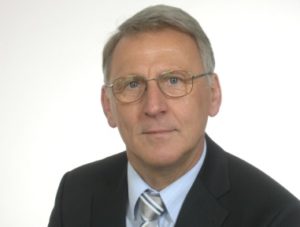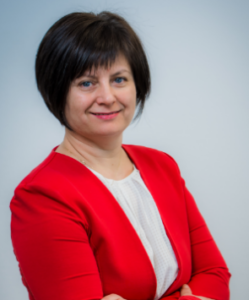
Joint Event SIITME 2019
Challenges to Electronics for autonomous and electrical driving
Podium discussion:
“Challenges to Electronics for autonomous and electrical driving”
 |
Podium discussion moderator:
Prof. Dr.-Ing. habil. Dr. H. C. Mult. Klaus-Jürgen Wolter Technische Universität Dresden wolter@avt.et.tu-dresden.de Panel Discussion: Trends in automotive electronics |
Podium discussion topics
The safety, efficiency and degree of automation of electro mobility depending on the functions and reliability of future electronic modules for autonomous and electrical driving. The application of these modules ranges from sensors for the perception of the vehicle environment as well as condition monitoring, the communication electronics inside and outside the vehicle, infotainment and navigation systems to power electronics and energy storage for electric propulsion, vehicle air conditioning and vehicle lighting. The future of these modules is characterized by demands for higher functionality with simultaneous further miniaturization, real-time signal processing, sensor fusion using AI, high reliability and robustness as well as modern and cost-effective manufacturing processes.
The panelists will discuss the following questions with the audience:
How to manage the exploding technical complexity?
- – The increasing amount of semiconductors (today 600 in the future 7000),
- – The need for higher integration level on chip, package and module level,
- – The increasing reliability requirement due to extended lifetime requirements,
- – The much stringer safety requirements,
- – The increasing liability risks for OEMs and the supply chain for autonomous driving.
How to educate the next generation of automotive engineers?
- – Requirements of the car industry to the curricular contents,
- – Need for closer partnership between the car industries and academia.
The panelists will be:
- – Prof. Klaus-Jürgen Wolter, Technische Universität Dresden (moderator)
- – Prof. Paul Svasta, University Politehnica of Bucharest
- – Dan Lazarescu, Director at Robert Bosch GmbH, Engineering Center Cluj
- – Cosmin Moisa, Head Of Department at Continental Automotive Romania
Workshop Human Resources
Strategic Partnership for Education 2030 (Privée Room)
Previous editions of SIITME provided the favorable framework for meeting and collaborating with industrial and academic partners, with the purpose of developing a permanent partnership to support the future progress of the electronic industry. The two key elements considered are technology and human resources.
In present, we know that the European strategy has as priority the promotion of economic growth: sustainable, intelligent, based on the knowledge and on putting them into practice through innovation and inclusion oriented – employment. (www.mae.ro)
We are pleased to see the constant concern and motivation of the SIITME participants for research and innovation. Topics approached such as robotics, artificial intelligence, virtual prototype, intelligent network, thermal management, assembly and manufacturing technology, etc. are the proof that industry is in a continuous and fast technological transformation.
With focus on digitization, automation and robotization, the objective of the economic environment targets the opportunity to develop the skills and abilities of the next generation: cognitive flexibility, overall vision, critical thinking, innovation, etc. Our challenge as an employer is to develop a framework in which the aforementioned topics are not single and scattered, but are part of a solid strategy.
Miele’s constant involvement and support encourages the delivery of research projects with high potential for implementation, which helps the company grow in the direction of continuous improvement.
A work environment that owns and offers access to state-of-the-art technology and where employees feel encouraged to experiment and exchange know-how generates innovation.
Miele is constantly involved and supports the academic environment in order to align the concept of education with the requirements of the industry.
Only through mutual support we can reach solutions, so that the future generation could have the possibility of developing a professional career in any industry.

Aurelia Florea
Human Resources and Procurement Director, Miele Brasov
Workshop Agenda
12:00-12:20 Workshop opening, Strategic Partnership for Education
Dan PITICĂ, Ph.D., Vice-rector at Technical University of Cluj-Napoca
Aurelia FLOREA, HR Director Miele Romania and Working Group Coordinator – Industry and Academic Environment
Paul SVASTA, Ph.D., University Politehnica of Bucharest, Association for Promoting Electronics Technology
12:20-14:45 Presentation Session: Relationship: Educational environment – Industrial environment – Concrete actions
Chairman: Dan PITICĂ, Ph.D., Vice-rector at Technical University of Cluj-Napoca
Co-chair: Cosmin MOISA – Head Of Department at Continental Automotive Romania
Strategic Partnership for Education worging group activities – folow-up
Aurelia FLOREA, HR Director Miele Romania and Working Group Coordinator – Industry and Academic Environment
Holistic Education
Importance of Academic and Industry Partnership – Good actions practices that contribute to the development of competences
Fabian HENZE, Agile Coach Miele Gutersloh, Germany
Q&A session
Debate related to the Holistic education Approach
Workshop participants
14:45-14:55 Summary and further actions
Aurelia FLOREA, HR Director Miele Romania and Working Group Coordinator – Industry and Academic Environment
Hungary/Romania Section Jt Chapter, EP21
(Privée Room)
Agenda
Chairpersons of the meeting (Chapter founders, 1999):
Prof. Zsolt Illyefalvi-Vitez, Ph.D., Budapest University of Technology and Economics
Prof. Paul Svasta, Ph.D., University Politehnica of Bucharest, Association for Promoting Electronics Technology
Invited persons:
Toni Mattila, Ph.D. – Connected Intelligent Industries Finland – IEEE-EPS Welcome
Cristian Negrescu, Ph.D. – IEEE Romania Section Chair
Marian Petrescu, Ph.D. – Continental Automotive Romania
Klaus-Jürgen Wolter Ph.D. – Technical University of Dresden
Report regarding the IEEE-EPS Hu&Ro Joint Chapter activity
Ciprian Ionescu, Ph.D. – Chapter Chair
Strategic approach of the ESTC events
Toni Mattila, Ph.D. – IEEE-EPS Region 8 Director
Cooperation between NTC (Nanotechnology Council) and Hu&Ro EPS Chapter
Attila Bonyár, Ph.D., Budapest University of Technology and Economics
Hu&Ro Chapter officer election
Election Committee: Paul Svasta, Zsolt Illyefalvi-Vitez, Norocel Codreanu
Professional development short course
„Extension of thermal transient testing towards LED multi-domain modelling and reliability testing”
Abstract
In the past two decades thermal transient testing became common practice in thermal characterization of packaged semiconductor devices. The classical application is the identification of thermal metrics of packages such as junction-to-case or junction-to-ambient thermal resistance. The structure functions derived from measured thermal impedance curves offer much more than just identification of thermal metrics. The detailed structural information obtained about the junction to ambient heat-flow path allows e.g. qualification of die attach layers (detect voiding or delamination) which can be further exploited in reliability testing. Structure functions also help calibrate detailed 3D thermal models of device packages and derive compact thermal models as well. In case of LEDs, the real thermal resistance / impedance can be derived only if thermal and radiometric measurements are combined. The obtained test data also support modelling the multi-domain behavior of LED packages. This was exploited in the recently finished Delphi4LED H2020 ECSEL project of the EU, resulting in new, Industry 4.0 workflows of designing LED based luminaires. The topics covered by the course include:
- Overview of thermal testing standards used in package characterization, the basic principles of thermal transient testing
- Introduction to structure functions and their applications
- Issues of testing LED packages; isothermal IVL measurements
- Test based multi-domain modelling of LEDs; using LED multi-domain models in an Industry 4.0 compliant luminaire design flow
- Thermal transient testing combined with power cycling and LED life-time tests; new power cycling testing solutions for power semiconductor device packages
Prof. András Poppe, Ph.D., Head of the Department of Electron Devices
Budapest University of Technology and Economics